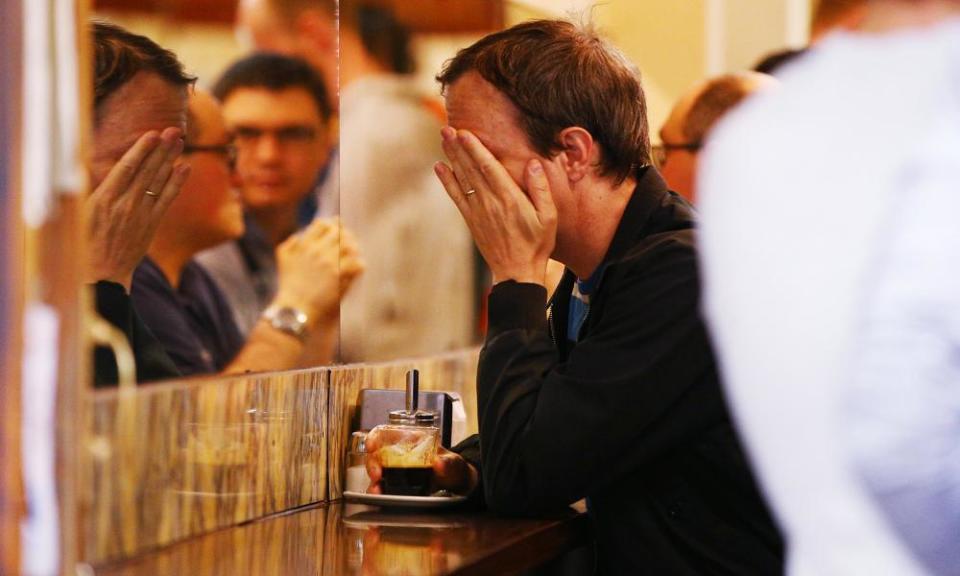Jobkeeper cuts to strip $9.9bn from Australian economy by Christmas, report says

Cuts to jobkeeper wage subsidies will take $9.9bn out of the economy by Christmas, with a $1.52bn reduction in fortnightly support from late September, according to the McKell Institute.
The release of the report on the future of the Morrison government’s signature economic policy comes as the OECD warns against “premature budgetary tightening at a time when economies are still fragile”.
The OECD, in its September interim economic outlook, finds Australia’s economy is set to shrink by 4.1% in 2020, a 0.9% improvement on its June forecast, but bang-on the G20 average of -4.1%.
In 2021, the OECD estimates that Australia’s economy will grow by 2.5%, down 1.6% from the June forecast, in part because “localised lockdowns, border closures and new restrictions” to prevent a second wave have caused a “moderation” of the expected recovery.
Labor’s shadow treasurer, Jim Chalmers, has seized on both reports, arguing that “ongoing support from the government in the economy will be required to tackle the jobs crisis and set Australia up for the recovery”.
The McKell Institute found that from 28 September 1.05 million part-time workers will have their $1,500 fortnightly jobkeeper payment slashed to $750, collectively losing a total of $787m a fortnight. Some 2.4m full-time workers will see the payment cut to $1,200 a fortnight.
The biggest cuts to jobkeeper will be in:
New South Wales and the Australian Capital Territory – where 1.3m workers will have payments cut by $581m a fortnight;
Victoria, where 1m workers will see a $443m fortnightly reduction; and
Queensland, with 706,723 workers losing $307m a fortnight.
The cuts to jobkeeper come on top of reductions in the coronavirus supplement on jobseeker wage subsidies, estimated by Deloitte Access Economics to reduce the size of the economy by $31.3bn and cost the equivalent of 145,000 full-time jobs over two years.
The OECD report provides some support to changes to jobkeeper, noting that wage subsidies are “effective in preserving existing jobs but may hinder desirable post-crisis adjustment across sectors, especially if the recovery is slower than expected”.
“Over time, their focus needs to be adjusted gradually to support workers rather than jobs,” it said.
“Raising the financial contributions from employers to the cost of unworked hours in these schemes, and reassessing the eligibility of companies claiming support, could help to identify businesses who expect to remain viable for an extended period and encourage companies to increase working hours as soon as possible.”
Although it may be necessary to make “adjustments” to economic supports, the OECD called for fiscal policy support to be pursued in 2021 – warning that premature withdrawal would “stifle growth”.
“With the recovery remaining hesitant, sporadic outbreaks of the virus still occurring, and many sectors still struggling to adjust, fiscal and monetary policy support needs to be maintained to preserve confidence and limit uncertainty,” it said.
Related: Jobseeker cut will leave 80% skipping meals, survey finds
The OECD found Australia is expected to outperform most economies in 2020 except Korea (-1%), Turkey (-2.9%), Indonesia (-3.3%) and the US (-3.8%).
But in 2021, Australia’s expected growth of 2.5% lags behind all major economies except Japan (1.5%) and South Africa (1.4%).
Chalmers said the OECD “joins the Reserve Bank and prominent economists’ calls for more support, not less, with the Australian economy forecast to be weaker for longer”.
“During the deepest recession in almost a century and an escalating jobs crisis, it makes no sense for the Morrison government to be withdrawing support without a comprehensive jobs plan to replace it,” he said.
“Scott Morrison should reconsider his cuts to jobkeeper which are coming at the worst possible time for many workers, businesses and communities who are relying on it.”

 Yahoo Finance
Yahoo Finance 